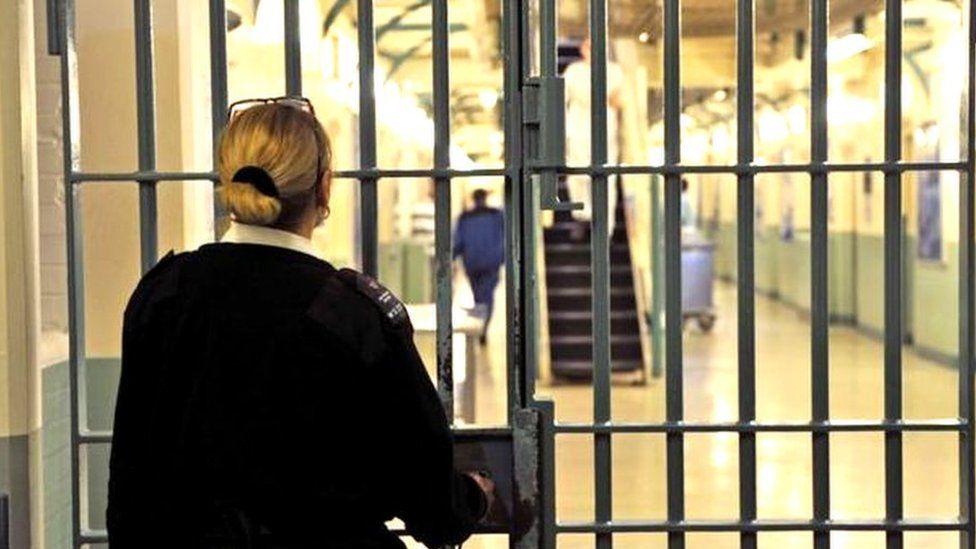Low-level offenders could be released early under jail reforms
- Published

Latest figures show 88,225 people currently incarcerated in England and Wales, leaving only 560 empty spaces
Prisons will be allowed to release some "less serious offenders" on probation early to relieve overcrowding in jails in England and Wales, the justice secretary has said.
The prison population has ballooned in recent decades as a result of tougher sentences and court backlogs.
Alex Chalk announced justice reforms aimed at freeing up prison spaces.
The minister said the plans included jailing fewer low-level offenders and deporting more foreign prisoners.
"We must do whatever it takes to always ensure there are always enough prison places to lock up the most dangerous offenders to keep the British public safe," Mr Chalk said.
Labour's shadow justice secretary, Shabana Mahmood, said the plans announced by Mr Chalk were a "damning indictment of the government's collective failure".
"The reason we are in this position," Ms Mahmood said, "is that the government has consistently broken its promises to deal with the rising prison population."
The Lib Dem's home affairs spokesman, Alistair Carmichael, said: "A merry-go-round of inexperienced justice ministers have made up prison policy on the fly for far too long
"Our prison system is in crisis and in desperate need of real reform, not the confusion, gimmicks and reheated policies that have already failed on offer from Alex Chalk."
In his statement, Mr Chalk said "we must use prison better" because the "prison population is greater than it has ever been".
Mr Chalk said the government wanted to bring forward legislation to keep the most serious sexual offenders in jail for the entirety of their sentences.
But the justice secretary said the decision to put the worst criminals in jail for longer meant taking a different approach to other offenders to make more space in prisons.
Mr Chalk told MPs some "less serious offenders" could be moved out of prison on to licence up to 18 days before their automatic release date.
He also said then government would look to remove more foreign prisoners by deploying more caseworkers and seeking new prisoner transfer deals with other countries.
Other announcements included:
£400m for more prison places, enough for 800 new cells
A presumption against prison sentences of less than 12 months, in new legislation to be brought forward
Instead of going to prison, low-level offenders will be punished in the community
A doubling of the number of GPS tags available to the courts to help them manage offenders in the community
A plan to introduce a law to allow prisoners to be held overseas, something that has been tried by Belgium and Norway
Mr Chalk has already said he wants some offenders to do community work rather than short stints in prison.
Writing in the Sunday Telegraph, external over the weekend, he said: "A short stretch of a few months inside isn't enough time to rehabilitate criminals, but is more than enough to dislocate them from the family, work and home connections that keep them from crime.
"This is the wrong use of our prison system and taxpayers' money. It doesn't deliver for victims and it doesn't cut crime."
Ministers have been under pressure to relieve a nearly full prison system.
Figures from earlier this year, external revealed that 61% of prisons were overcrowded.
The system's total capacity is 88,782, while the current prison population is 88,225 - that means prisons are about 500 places away from reaching full capacity.
The prison population has increased by 7,000 over the past year - an increase of 8%. It is projected to rise to 94,400 by March 2025.
The state of prisons in England and Wales was thrown into the spotlight last month when a man was charged with escaping from Wandsworth Prison.
A report by the Independent Monitoring Board said the prison was "unsafe and inhumane".
The watchdog also raised concern about overcrowding, noting that in two wings there were 11 shower stalls for 265 men.
Why are prisons so overcrowded?
Various factors have contributed to prison overcrowding in England and Wales.
The court backlog, external grew during the pandemic and was made worse by the long-running criminal barristers' strike in 2022. There are currently 65,000 serious criminal cases in the backlog - nearly double the number before the pandemic.
As the court backlog grew, so did the number of prisoners on remand, external awaiting trial, which had reached 15,500 people by June 2023.
In addition, the proportion of sentenced prisoners, external serving sentences of four years or more has gone up to 56% from 40% a decade ago.
To ease the overcrowding, the government said in 2021 it would build 20,000 more prison places by 2025. Only 5,500 additional prison places, external had opened by October 2023.
Related Topics
- Published6 February 2023